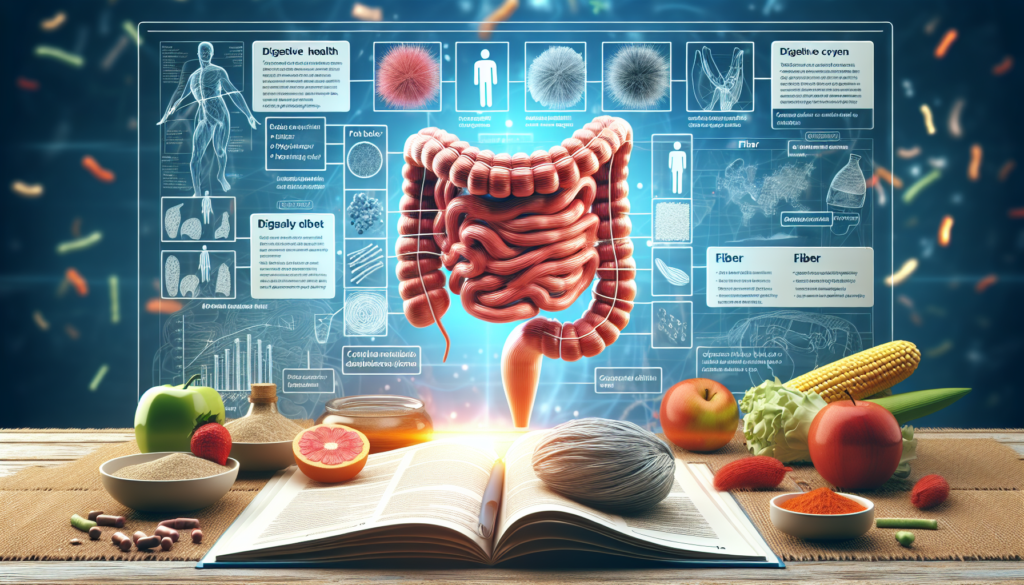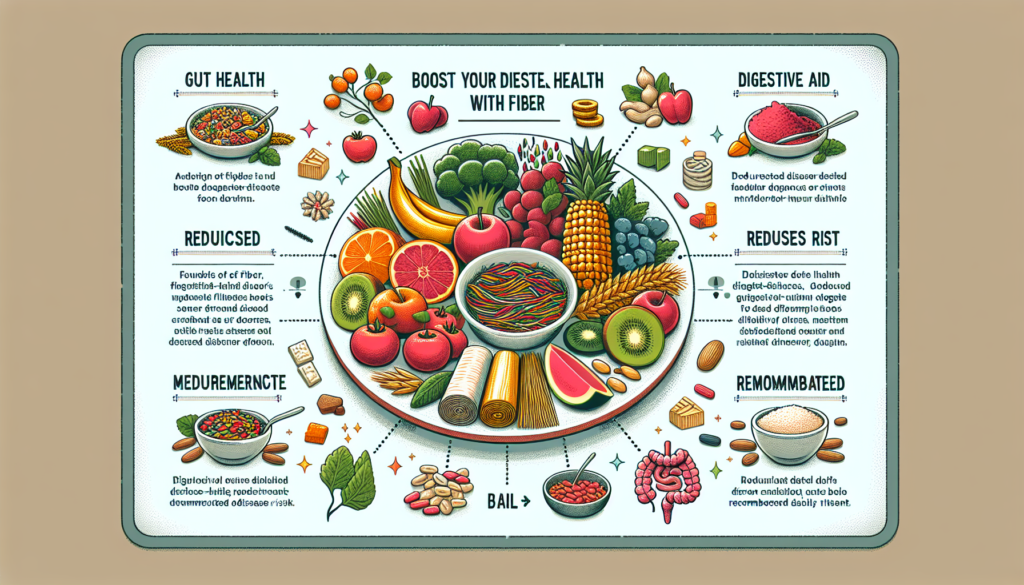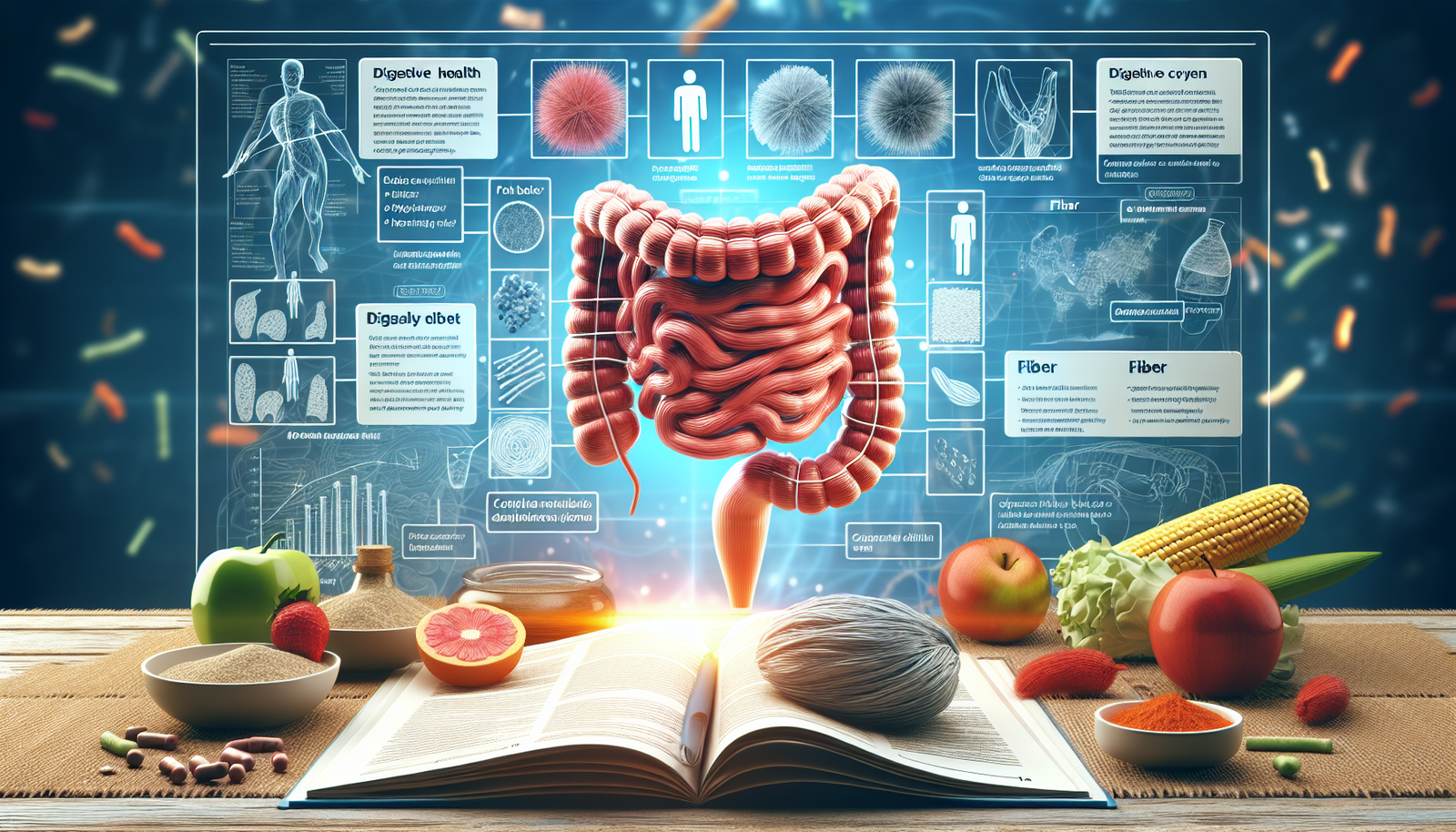Are you looking to improve your digestive health? Look no further! In this comprehensive overview, we will explore the crucial role that fiber plays in maintaining a healthy digestive system. From its ability to prevent constipation to promoting a healthy gut microbiome, fiber is a true superhero when it comes to digestive health. Get ready to learn all about the benefits of fiber and how you can incorporate it into your daily diet for a happier digestive system.
What is Fiber?
Definition
Fiber, also known as dietary fiber, is a type of carbohydrate that cannot be broken down by the body’s digestive enzymes. It is found in plant-based foods such as fruits, vegetables, whole grains, legumes, nuts, and seeds. Unlike other carbohydrates, fiber cannot be digested or absorbed by the body, but it plays a crucial role in maintaining good digestive health.
Types of Fiber
There are two main types of fiber: soluble fiber and insoluble fiber. Soluble fiber dissolves in water and forms a gel-like substance in the digestive tract. It helps to slow down the digestion process and contributes to a feeling of fullness. Insoluble fiber, on the other hand, does not dissolve in water and adds bulk to the stool, promoting regular bowel movements.
Sources of Fiber
Fiber can be found in a wide variety of plant-based foods. Some of the best sources of fiber include whole grains such as oats, brown rice, and whole wheat bread; legumes like lentils, chickpeas, and black beans; fruits such as apples, oranges, and berries; vegetables like broccoli, Brussels sprouts, and carrots; and nuts and seeds like almonds, chia seeds, and flaxseeds.
How Fiber Affects Digestion
Digestive Process
When you consume fiber-rich foods, they pass through your digestive system without being broken down or absorbed. As they move through the stomach and into the small intestine, soluble fiber absorbs water and forms a gel-like substance that slows down the digestion process. This allows for better nutrient absorption and helps maintain steady blood sugar levels.
Effects on Gut Microbiota
Fiber also plays a crucial role in maintaining a healthy balance of gut microbiota, which are the trillions of bacteria that inhabit our digestive system. Certain types of fiber, known as prebiotics, serve as fuel for beneficial bacteria, promoting their growth and activity. By nourishing these good bacteria, fiber helps to maintain a healthy gut environment and supports overall digestive health.
Prevention of Constipation
One of the most well-known benefits of fiber is its ability to prevent and relieve constipation. Insoluble fiber adds bulk to the stool, making it easier to pass through the intestines. Additionally, soluble fiber helps to soften the stool and promote regular bowel movements. By adding more fiber to your diet, you can alleviate constipation and keep your digestive system running smoothly.

Health Benefits of Fiber
Promotes Regular Bowel Movements
Adequate fiber intake promotes regular bowel movements, preventing constipation and reducing the risk of developing hemorrhoids. The bulk and softness provided by fiber make it easier for the stool to pass through the intestines, preventing discomfort and promoting overall digestive health.
Improves Digestive Health
Fiber acts as a natural detoxifier by helping to remove waste products and toxins from the body. It adds bulk to the stools, which helps to regulate bowel movements and prevent digestive issues like diarrhea. Additionally, a diet rich in fiber is associated with a lower risk of developing digestive disorders such as diverticular disease and inflammatory bowel disease.
Manages Weight
Fiber-rich foods are more filling and can help you feel satisfied with smaller portion sizes. By increasing your fiber intake, you may be able to better manage your weight or even promote weight loss. Fiber also helps to regulate blood sugar levels, keeping you feeling fuller for longer and reducing the risk of overeating.
Lowers Cholesterol Levels
High levels of low-density lipoprotein (LDL) cholesterol, often referred to as “bad” cholesterol, can increase the risk of heart disease. Soluble fiber has been shown to help lower LDL cholesterol levels by interfering with its absorption in the intestines. By incorporating more fiber into your diet, you can help maintain healthy cholesterol levels and support cardiovascular health.
Controls Blood Sugar Levels
Fiber can help regulate blood sugar levels by slowing down the rate at which glucose is absorbed into the bloodstream. This can be particularly beneficial for individuals with diabetes or those at risk of developing the condition. By including fiber-rich foods in your meals, you can better manage your blood sugar levels and prevent spikes in insulin.
Reduces the Risk of Colon Cancer
Research suggests that a high-fiber diet may reduce the risk of developing colorectal cancer. The exact mechanisms are not fully understood, but it is believed that fiber promotes regular bowel movements, which helps to eliminate harmful substances from the colon. Additionally, fiber may help to reduce inflammation and provide protection against the development of cancerous cells.
Dietary Recommendations
Daily Fiber Intake
The recommended daily intake of fiber varies depending on age, gender, and overall health. In general, adults should aim to consume between 25 and 38 grams of fiber per day. However, many people fall short of this goal due to the prevalence of processed and low-fiber foods in their diets. Increasing your fiber intake gradually and incorporating a variety of fiber-rich foods into your meals can help you meet the recommended daily amount.
Fiber Supplement Guidelines
While it is ideal to obtain fiber from whole foods, fiber supplements can be a convenient option for individuals who struggle to meet their daily fiber needs. When choosing a fiber supplement, opt for those made from natural sources such as psyllium husk or acacia fiber. Start with a low dosage and gradually increase as tolerated to prevent digestive discomfort. It is essential to drink plenty of water when taking fiber supplements to ensure they are properly absorbed and do not cause blockages in the digestive system.
Balancing Fiber Intake
It is important to note that too much fiber can have negative effects on digestion. Consuming excessive amounts of fiber without adequate fluid intake can lead to constipation, bloating, and discomfort. Aim for a balance of both soluble and insoluble fiber and make sure to drink plenty of water throughout the day to promote healthy digestion.

High-Fiber Foods
Whole Grains
Whole grain foods are an excellent source of fiber. Opt for whole grain bread, cereals, pasta, and rice instead of their refined counterparts. Add whole grain oats to your breakfast, swap white bread for whole wheat bread, and choose brown rice over white rice to increase your fiber intake.
Legumes
Legumes, such as lentils, chickpeas, and black beans, are packed with fiber. They can be easily incorporated into soups, stews, salads, and side dishes. Add canned beans to your favorite chili recipe or make a delicious hummus dip using chickpeas for a tasty and fiber-rich addition to your meals.
Fruits
Fruits are not only delicious but also a great source of fiber. Berries, apples, oranges, bananas, and pears are all excellent choices. Snack on a piece of fruit, add berries to your morning yogurt or oatmeal, or blend them into a refreshing smoothie for a fiber-packed treat.
Vegetables
Adding vegetables to your meals is an easy and tasty way to increase your fiber intake. Broccoli, Brussels sprouts, carrots, spinach, and kale are all high in fiber. Roast a variety of vegetables with olive oil and seasoning, sauté them as a side dish, or incorporate them into your favorite stir-fry for a nutritious and fiber-rich meal.
Nuts and Seeds
Nuts and seeds provide a healthy dose of fiber, along with essential nutrients. Almonds, chia seeds, flaxseeds, and walnuts are particularly high in fiber. Add them to your salads, sprinkle them on top of yogurt or oatmeal, or enjoy a handful as a satisfying snack.
Fiber and Water Intake
Importance of Hydration
To fully reap the benefits of fiber, it is important to maintain proper hydration. Fiber absorbs water in the digestive tract, helping to soften the stool and promote regular bowel movements. Without adequate fluid intake, fiber can become dry and compacted, leading to constipation and discomfort. Drinking plenty of water throughout the day ensures that fiber can work effectively and supports optimal digestion.
Effects of Insufficient Water Consumption
Insufficient water consumption can lead to issues when increasing fiber intake. It is crucial to drink enough water when consuming a high-fiber diet, as inadequate hydration can cause digestive problems such as bloating, gas, and cramping. If you experience these symptoms, try increasing your water intake and see if it helps alleviate the discomfort.
Potential Side Effects of High Fiber Intake
Bloating and Gas
Some individuals may experience bloating and gas when increasing their fiber intake, especially if they do so abruptly. This is commonly due to the fermentation process that occurs in the gut when bacteria break down the fiber. To minimize these side effects, gradually increase your fiber intake, and make sure to drink plenty of water to aid digestion.
Abdominal Discomfort
In some cases, a sudden increase in fiber intake can cause abdominal discomfort. This discomfort may manifest as cramping or a feeling of fullness. If you experience these symptoms, try spacing out your fiber intake throughout the day, and listen to your body to determine what level of fiber intake is comfortable for you.
Diarrhea
While fiber is generally regarded as beneficial for preventing constipation, consuming excessive amounts of fiber without adequate water intake can have the opposite effect and lead to diarrhea. It is important to strike a balance with fiber consumption and ensure sufficient fluid intake to avoid digestive issues.
Tips for Increasing Fiber Intake
Gradual Increase
To avoid discomfort, gradually increase your fiber intake rather than making sudden drastic changes. This will allow your body and digestive system to adjust slowly. Start by adding small amounts of fiber-rich foods to your meals and gradually increase over time.
Choose Whole Foods
Whenever possible, choose whole foods over processed foods. Whole foods are generally higher in fiber and provide more nutrients. Opt for whole grains, fresh fruits, and vegetables, unprocessed legumes, and raw nuts and seeds to maximize your fiber intake.
Include a Variety of Fiber-Rich Foods
To ensure you’re getting a good mix of soluble and insoluble fiber, strive to include a variety of fiber-rich foods in your daily diet. This will provide a broader range of health benefits and contribute to optimal digestive health. Mix up your choices of whole grains, fruits, vegetables, legumes, and nuts and seeds to keep your meals interesting and nutritious.
Read Food Labels
When shopping for packaged foods, take the time to read the nutrition labels. Look for foods that are high in fiber and low in added sugars and unhealthy fats. Pay attention to the serving sizes and the fiber content per serving to make informed choices.
Experiment with Cooking Techniques
Get creative in the kitchen and experiment with different cooking techniques to incorporate more fiber into your meals. Try roasting or grilling vegetables for added flavor and texture, blending fruits and vegetables into smoothies, or adding ground flaxseeds or chia seeds to baked goods for an extra boost of fiber.
Supplements and Medical Considerations
Fiber Supplements
While it is generally best to obtain fiber from whole foods, fiber supplements can be a helpful addition for individuals struggling to meet their recommended intake. However, it is important to remember that supplements should not be relied on as a replacement for a healthy and balanced diet. If considering a fiber supplement, consult with a healthcare professional to determine the appropriate dosage and ensure it is suitable for your specific needs.
When to Consult a Doctor
If you have any underlying health conditions or concerns, it is always best to consult with a healthcare professional before making significant changes to your diet or starting a fiber supplement. They can provide personalized advice based on your individual needs and help you navigate any potential risks or interactions.
Conclusion
Fiber plays a vital role in maintaining good digestive health and offers numerous health benefits. It promotes regular bowel movements, improves digestive health, manages weight, lowers cholesterol levels, controls blood sugar levels, and reduces the risk of colon cancer. By incorporating a variety of fiber-rich foods into your diet, you can ensure an adequate intake of fiber. Remember to drink plenty of water to support the digestion of fiber and avoid potential side effects. Gradually increase your fiber intake, choose whole foods, read food labels, and experiment with different cooking techniques to enhance the fiber content of your meals. Fiber supplements can be considered if needed, but it is always important to consult with a healthcare professional before starting them. By prioritizing a balanced and fiber-rich diet, you can support optimal digestive health and overall well-being.

